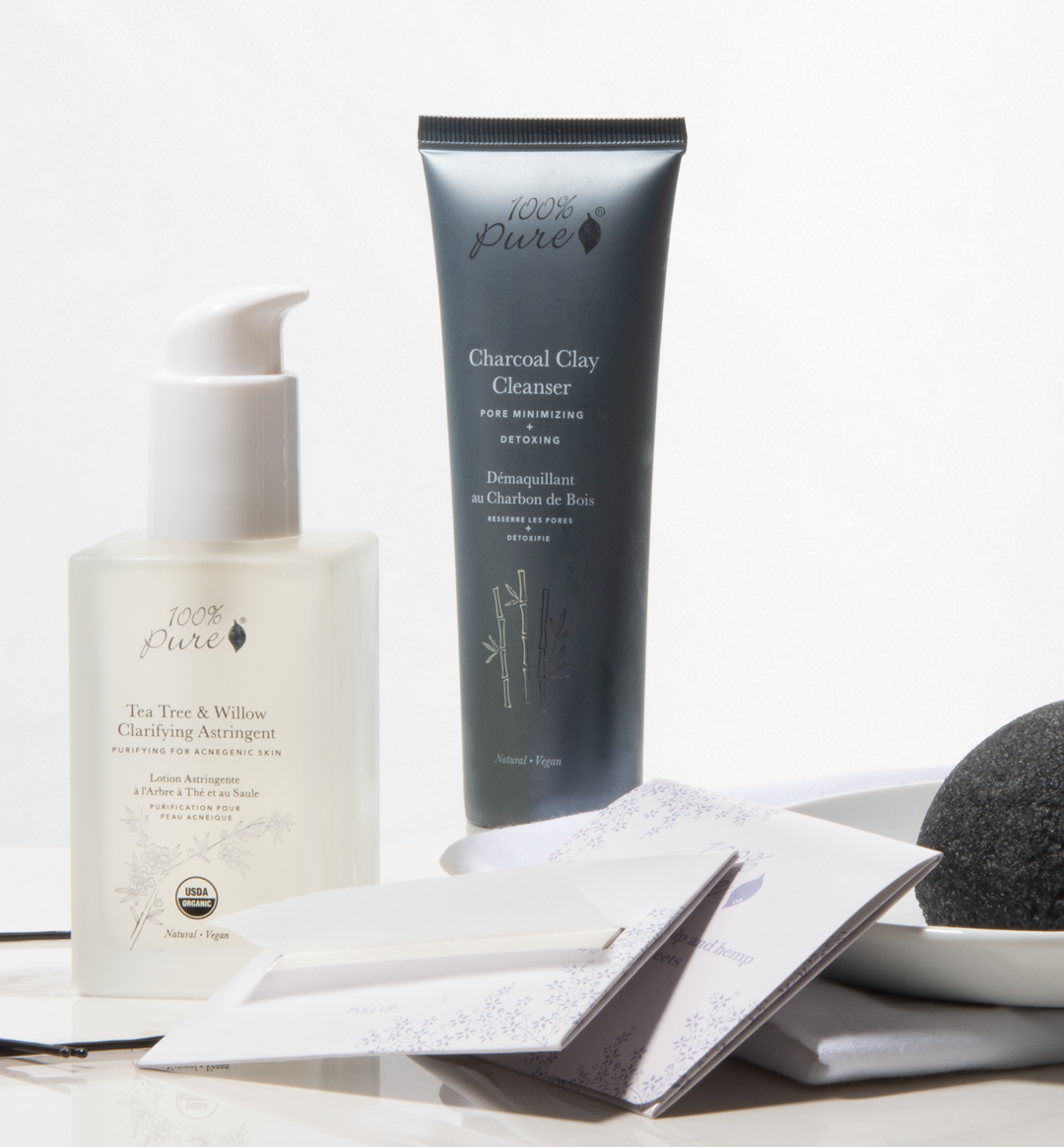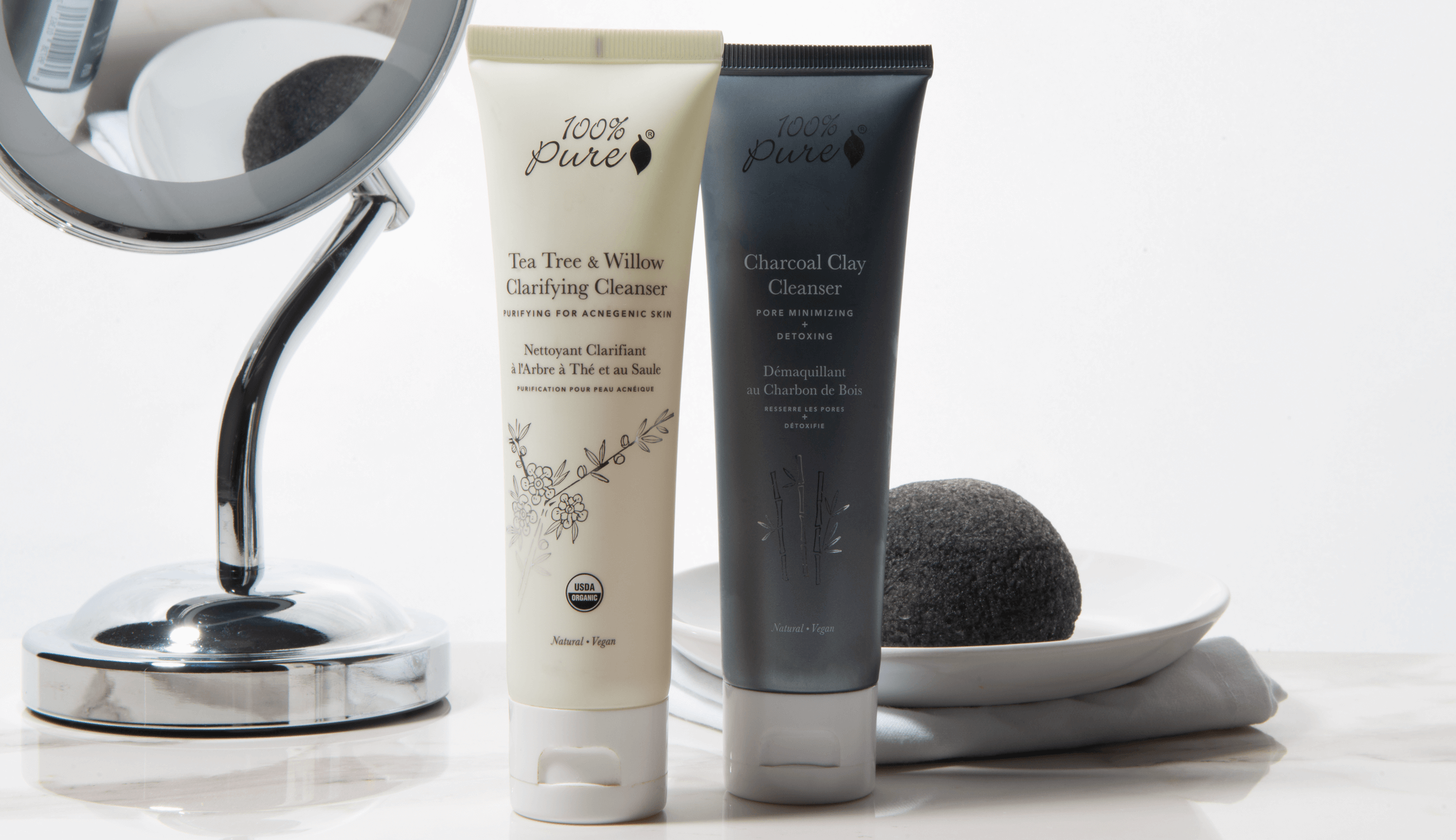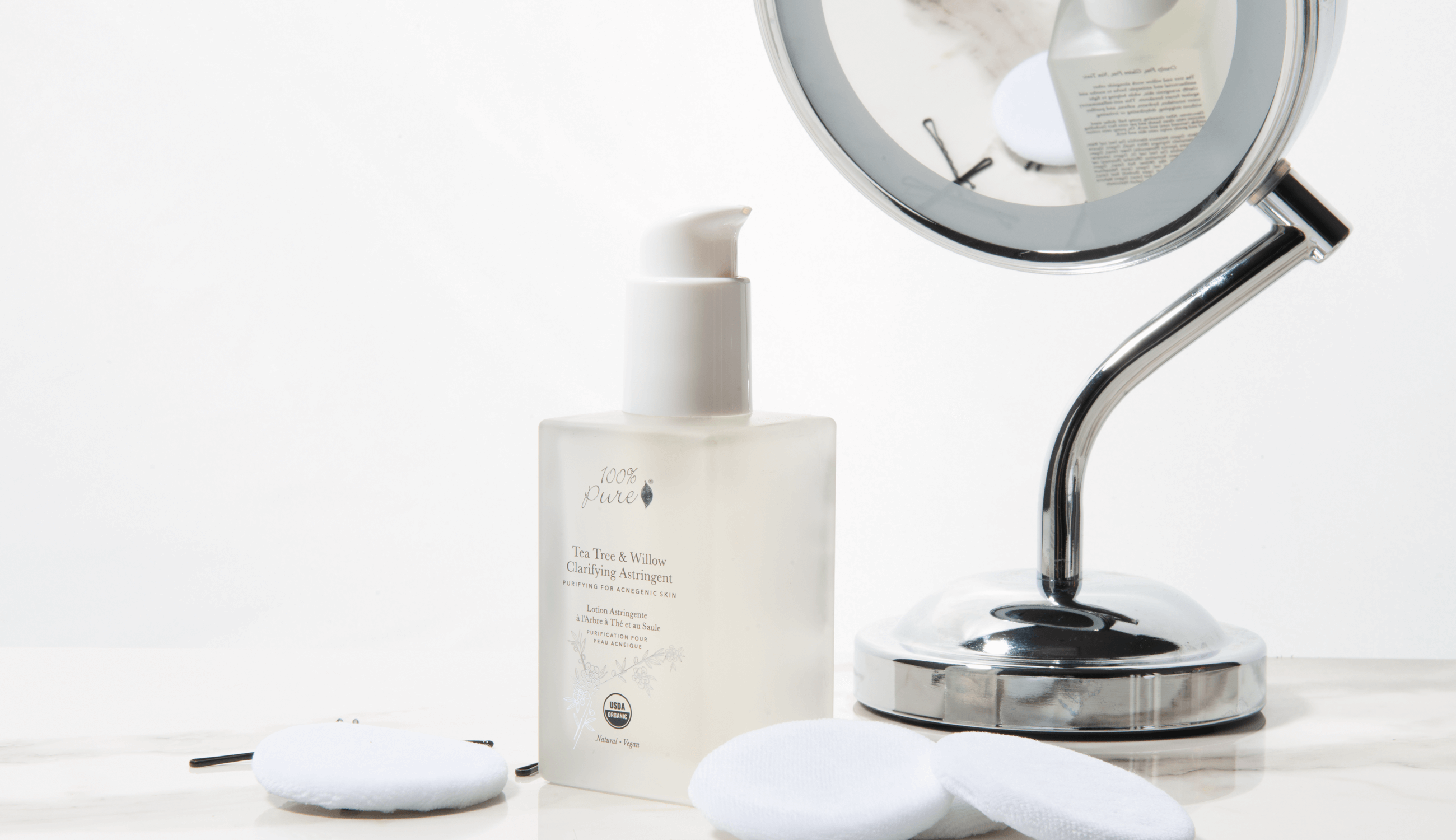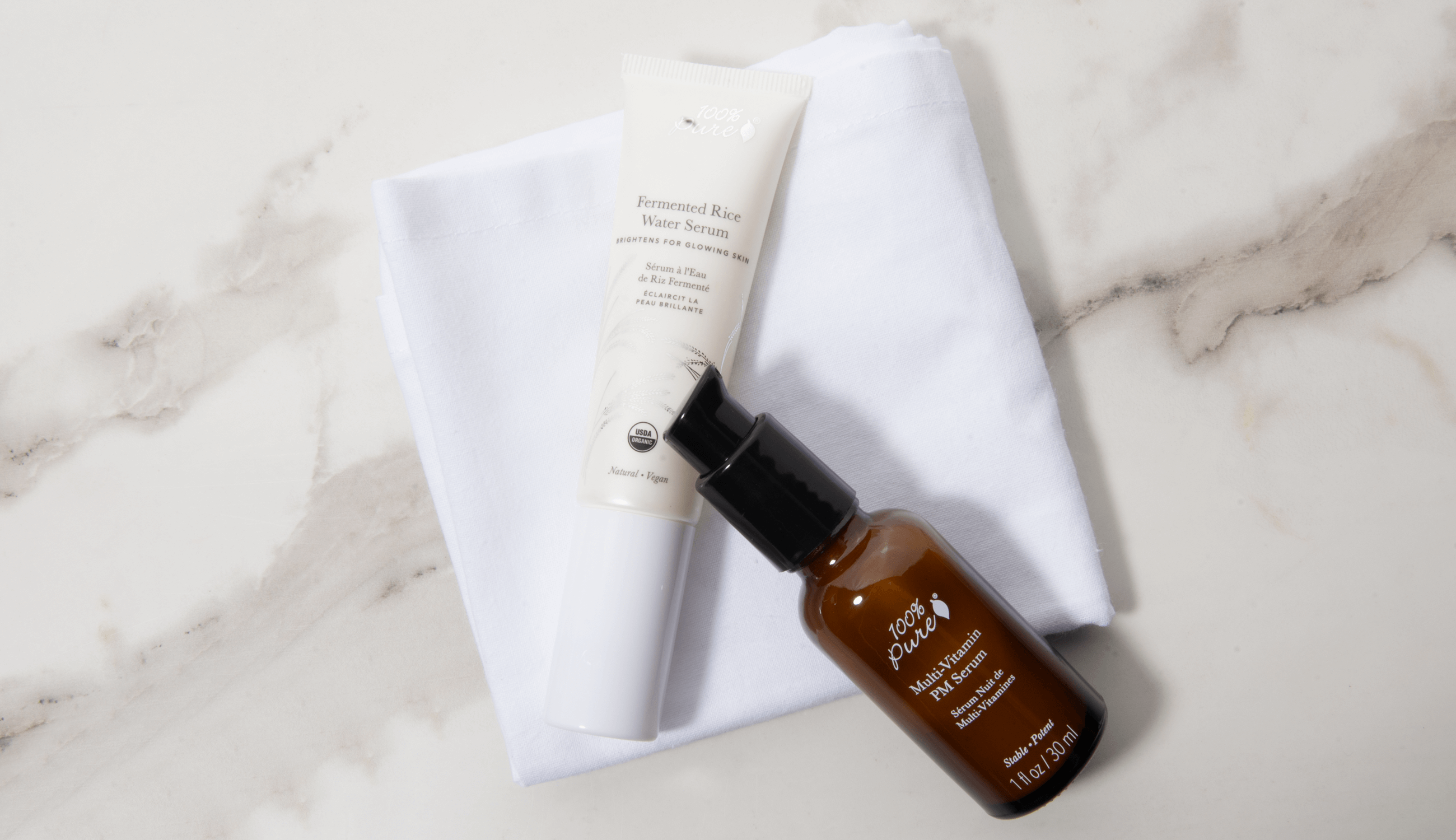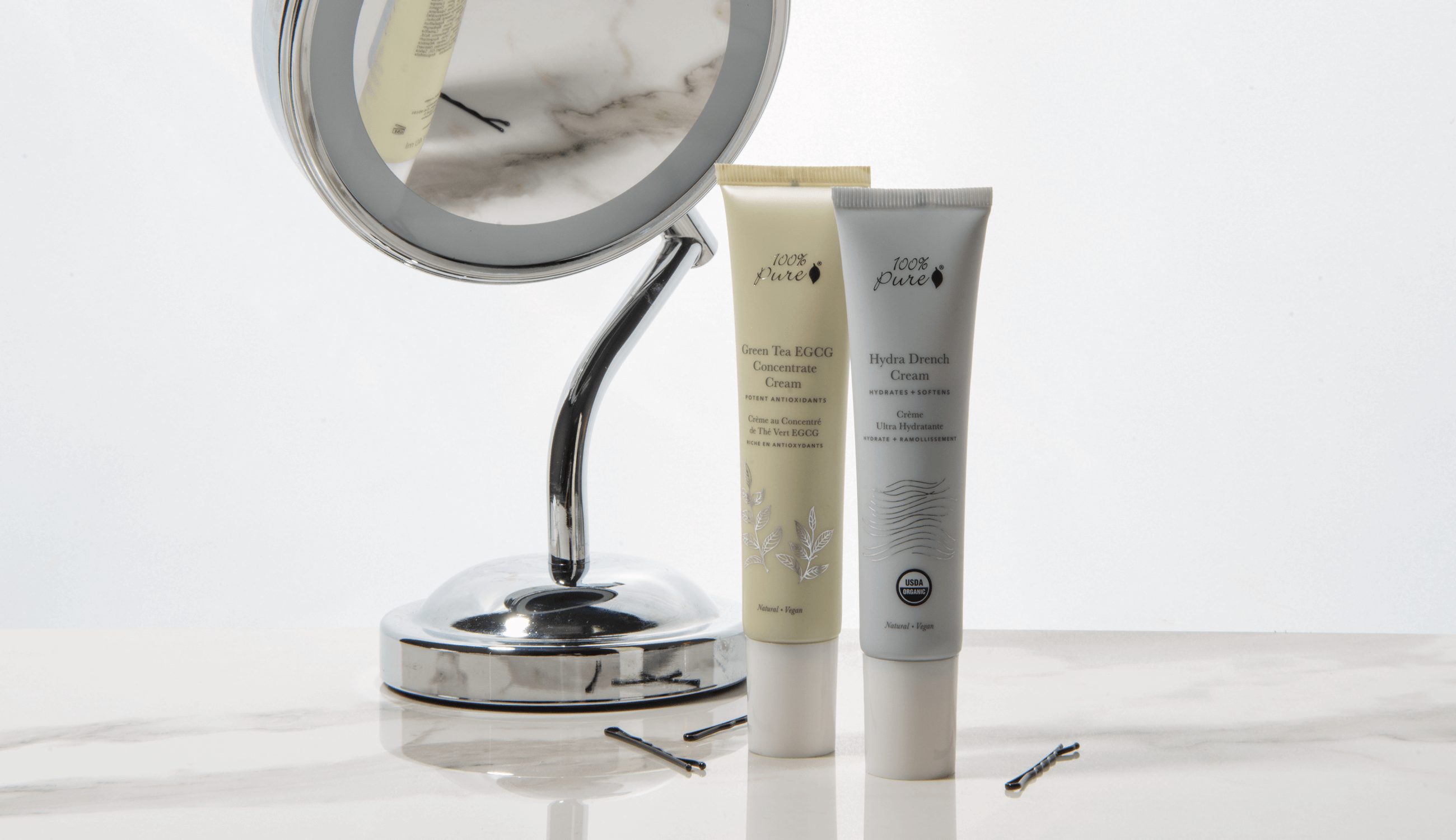Oily skin can be a real drag. While oily skin can keep skin looking younger for longer, it can also lead to clogged pores, blemishes, and excess shine. People with overactive sebaceous (oil) glands tend to deal with a shinier T-zone: chin, nose, and forehead being the main areas affected by excess shine. Sebum (oil) produced by our skin has a slightly sticky texture. This sticky texture turns your skin’s surface into a catch-all for dirt, sweat, and debris. If oily skin is not regularly cleansed and purified, your pores can become a breeding ground for bacteria, meaning prime conditions for breakouts.
Besides a shiny forehead, chin, and nose, oily skin types may notice some other regular symptoms. Pores clogged with excess oil, debris, and dead skin cells will lead to more acne: inflamed or infected sebaceous glands that appear as pimples, whiteheads, blackheads, and cysts. In addition to more regular breakouts, oily skin types are constantly plagued with makeup struggles. Finding a natural foundation for oily skin is key, and antibacterial oil blotting wipes are on standby at all times to keep shiny-face at bay.
The most important battle in the war against shine and breakouts is finding the best cleanser for oily skin. Don’t opt for anything harsh or stripping, since removing too much oil can actually trigger oil glands to work overtime to replace lost moisture in your skin. Flushing debris, bacteria, and excess oil from pores is absolutely crucial for keeping oily skin types out of the blemish zone.
Both our Tea Tree & Willow Acne Clear Cleanser and Charcoal Clay Cleanser are serious superheroes when it comes to battling oily skin. Our Tea Tree & Willow Acne Clear Cleanser means business when it comes to killing acne-causing bacteria and balancing oil production. This cleanser uses antibacterial herbs like tea tree, willow, and parsley to kill any bacteria caught in the pores by sticky sebum. Soothing tea tree and neem calm acne, and both lemon and rosemary balance oil production. Our Charcoal Clay Cleanser follows suit with bamboo charcoal and kaolin clay, which act as magnets for the dirt and debris in clogged pores. Antibacterial spearmint and lemongrass, plus oil-balancing lemon water, act as backup for fighting oily skin.
A concentrated natural toner is the invaluable sidekick to your superhero facial cleanser. The best toner for oily skin would be one with astringent properties, which can help to constrict the pore (meaning more oil control, less debris infiltration). Thanks to their high water content, toners can also flush leftover facial cleanser, makeup, or dead skin cells from the pores. Our Tea Tree & Willow Acne Clear Astringent is a powerhouse of antibacterial herbs and oils in a base of hydrating, soothing tea tree water and witch hazel. This oil-balancing toner is a must for calming breakouts, and a deeply refreshing treatment for oily or irritated skin.
Sneaking in a serum could spell relief for excessively oily skin. Delivering hydration and moisture to skin’s deepest layers with a serum’s super small molecule size can help your oil glands from over-producing. For daily use, we love the brightening Fermented Rice Water Serum or Green Tea EGCG Protective Serum for oily skin types, since between them they deliver oil-balancing essential oils and niacinamide, and antibacterial green tea and herbs.
If you’re looking for a nighttime serum for oily skin, look no further than our best selling Multi-Vitamin & Antioxidant Potent PM Serum. This powerful serum is more than an anti-aging powerhouse; it’s packed with oil-balancing ingredients like niacinamide, vitamin C, broccoli, spinach, and tomato.
If you have oily skin and you’re triggered by the word “moisturizer”, you’re not alone. A big misconception, that’s probably led to more problems than solutions, is that oily skin types don’t need to, or shouldn’t, use a moisturizer. This couldn’t be further from the truth! Finding the right moisturizer for oily skin however, is the real key to success. The best moisturizer for oily skin needs to have a lower oil content and a lighter body than your average formula. Our Hydra Drench Cream is an ultra light, oil-balancing moisturizer that’s made with oily skin types in mind. Made in a base of sensitive skin-friendly rose water, plus chia seed gel and oil. Chia’s zinc and fatty acid content can both soothe and purify acnegenic skin.
If you’re on the less severe end of the oily skin spectrum, you can even try a light-medium weight oil-balancing moisturizer. Our Green Tea EGCG Protective Cream uses the key phytonutrient in green tea to battle clogged pores and bacteria stuck in oily skin. Polyphenols in green tea damage bacterial membranes and fight against infection, meaning that it’s a useful tool for treating the bacterial growth that causes acne. It helps kill systemic bacterial inflammation for smoother, toned skin. The natural caffeine content in this moisturizer for oily skin also helps to stimulate circulation, meaning less inflammation and redness at the site of a breakout.
Now that you’ve got a tried-and-true skin care routine for oily skin, time to find your perfect foundation! Check out The Best Foundation for Oily Skin to really complete your oily skin care routine!
Frequently Asked Questions About Oily Skin
How often should you cleanse oily skin to prevent breakouts?
Cleansing oily skin twice a day, once in the morning and once in the evening, is typically sufficient to remove excess oil and impurities that can clog pores and cause breakouts. Over-cleansing can strip the skin of its natural oils, potentially leading to increased oil production as the skin tries to compensate. It’s important to use a gentle cleanser that is specifically formulated for oily skin to avoid irritation and maintain the skin’s balance.
How does a serum benefit oily skin?
Serums can be highly beneficial for oily skin because they provide targeted treatment without adding excess oil or heaviness. Benefits of using a serum for oily skin include:
-
Hydration without heaviness: Serums often contain lightweight, hydrating ingredients like hyaluronic acid, which moisturize the skin without clogging pores.
-
Oil control: Ingredients like niacinamide can help regulate sebum production, reducing excess oil.
-
Acne prevention: Serums with salicylic acid or tea tree oil can help prevent breakouts by keeping pores clear.
-
Skin texture improvement: Retinoids and vitamin C serums can help improve skin texture and reduce the appearance of pores.
What ingredients should I look for in skincare products for oily skin?
When selecting skincare products for oily skin, look for the following ingredients:
-
Salicylic Acid: Helps to exfoliate the skin and clear out pores.
-
Niacinamide: Regulates oil production and reduces inflammation.
-
Hyaluronic Acid: Provides hydration without making the skin greasy.
-
Clay (e.g., kaolin, bentonite): Absorbs excess oil and detoxifies the skin.
-
Tea Tree Oil: Has antibacterial properties that can help prevent acne.
-
Retinoids (e.g., retinol): Help to regulate skin cell turnover and reduce pore size.
.
How can I manage excess oil and shine throughout the day?
Managing excess oil and shine throughout the day can be done with a few simple steps:
-
Use blotting papers: These absorb excess oil without disturbing makeup.
-
Apply a mattifying primer: Helps control shine and provides a smooth base for makeup.
-
Set makeup with powder: Use a translucent or oil-absorbing powder to set makeup and reduce shine.
-
Choose oil-free and non-comedogenic products: These won’t clog pores or contribute to excess oil production.
-
Keep a lightweight, oil-free moisturizer: Hydrated skin is less likely to overproduce oil, so using an appropriate moisturizer can help balance oil levels.
Is exfoliation necessary for oily skin, and how often should it be done?
Exfoliation is important for oily skin as it helps to remove dead skin cells that can clog pores and lead to breakouts. However, it’s important not to over-exfoliate, as this can irritate the skin and lead to increased oil production. For oily skin, exfoliating 2-3 times a week is generally recommended. Use gentle exfoliants, such as products containing salicylic acid or glycolic acid, rather than harsh physical scrubs.
Source by [author_name]

